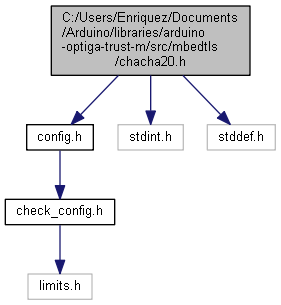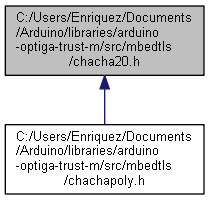This file contains ChaCha20 definitions and functions.
More...
#include "config.h"
#include <stdint.h>
#include <stddef.h>
Go to the source code of this file.
|
| void | mbedtls_chacha20_init (mbedtls_chacha20_context *ctx) |
| | This function initializes the specified ChaCha20 context. More...
|
| |
| void | mbedtls_chacha20_free (mbedtls_chacha20_context *ctx) |
| | This function releases and clears the specified ChaCha20 context. More...
|
| |
| int | mbedtls_chacha20_setkey (mbedtls_chacha20_context *ctx, const unsigned char key[32]) |
| | This function sets the encryption/decryption key. More...
|
| |
| int | mbedtls_chacha20_starts (mbedtls_chacha20_context *ctx, const unsigned char nonce[12], uint32_t counter) |
| | This function sets the nonce and initial counter value. More...
|
| |
| int | mbedtls_chacha20_update (mbedtls_chacha20_context *ctx, size_t size, const unsigned char *input, unsigned char *output) |
| | This function encrypts or decrypts data. More...
|
| |
| int | mbedtls_chacha20_crypt (const unsigned char key[32], const unsigned char nonce[12], uint32_t counter, size_t size, const unsigned char *input, unsigned char *output) |
| | This function encrypts or decrypts data with ChaCha20 and the given key and nonce. More...
|
| |
This file contains ChaCha20 definitions and functions.
ChaCha20 is a stream cipher that can encrypt and decrypt
information. ChaCha was created by Daniel Bernstein as a variant of
its Salsa cipher https://cr.yp.to/chacha/chacha-20080128.pdf
ChaCha20 is the variant with 20 rounds, that was also standardized
in RFC 7539.
- Author
- Daniel King damak.nosp@m.i.gh.nosp@m.@gmai.nosp@m.l.co.nosp@m.m
◆ MBEDTLS_ERR_CHACHA20_BAD_INPUT_DATA
| #define MBEDTLS_ERR_CHACHA20_BAD_INPUT_DATA -0x0051 |
Invalid input parameter(s).
◆ MBEDTLS_ERR_CHACHA20_FEATURE_UNAVAILABLE
| #define MBEDTLS_ERR_CHACHA20_FEATURE_UNAVAILABLE -0x0053 |
Feature not available. For example, s part of the API is not implemented.
◆ MBEDTLS_ERR_CHACHA20_HW_ACCEL_FAILED
| #define MBEDTLS_ERR_CHACHA20_HW_ACCEL_FAILED -0x0055 |
Chacha20 hardware accelerator failed.
◆ mbedtls_chacha20_context
◆ mbedtls_chacha20_crypt()
| int mbedtls_chacha20_crypt |
( |
const unsigned char |
key[32], |
|
|
const unsigned char |
nonce[12], |
|
|
uint32_t |
counter, |
|
|
size_t |
size, |
|
|
const unsigned char * |
input, |
|
|
unsigned char * |
output |
|
) |
| |
This function encrypts or decrypts data with ChaCha20 and the given key and nonce.
Since ChaCha20 is a stream cipher, the same operation is used for encrypting and decrypting data.
- Warning
- You must never use the same (key, nonce) pair more than once. This would void any confidentiality guarantees for the messages encrypted with the same nonce and key.
- Note
- The
input and output pointers must either be equal or point to non-overlapping buffers.
- Parameters
-
| key | The encryption/decryption key. This must be 32 Bytes in length. |
| nonce | The nonce. This must be 12 Bytes in size. |
| counter | The initial counter value. This is usually 0. |
| size | The length of the input data in Bytes. |
| input | The buffer holding the input data. This pointer can be NULL if size == 0. |
| output | The buffer holding the output data. This must be able to hold size Bytes. This pointer can be NULL if size == 0. |
- Returns
0 on success. -
A negative error code on failure.
◆ mbedtls_chacha20_free()
This function releases and clears the specified ChaCha20 context.
- Parameters
-
| ctx | The ChaCha20 context to clear. This may be NULL, in which case this function is a no-op. If it is not NULL, it must point to an initialized context. |
◆ mbedtls_chacha20_init()
This function initializes the specified ChaCha20 context.
It must be the first API called before using
the context.
It is usually followed by calls to
\c mbedtls_chacha20_setkey() and
\c mbedtls_chacha20_starts(), then one or more calls to
to \c mbedtls_chacha20_update(), and finally to
\c mbedtls_chacha20_free().
- Parameters
-
| ctx | The ChaCha20 context to initialize. This must not be NULL. |
◆ mbedtls_chacha20_setkey()
This function sets the encryption/decryption key.
- Note
- After using this function, you must also call
mbedtls_chacha20_starts() to set a nonce before you start encrypting/decrypting data with mbedtls_chacha_update().
- Parameters
-
| ctx | The ChaCha20 context to which the key should be bound. It must be initialized. |
| key | The encryption/decryption key. This must be 32 Bytes in length. |
- Returns
0 on success. -
MBEDTLS_ERR_CHACHA20_BAD_INPUT_DATA if ctx or key is NULL.
◆ mbedtls_chacha20_starts()
This function sets the nonce and initial counter value.
- Note
- A ChaCha20 context can be re-used with the same key by calling this function to change the nonce.
- Warning
- You must never use the same nonce twice with the same key. This would void any confidentiality guarantees for the messages encrypted with the same nonce and key.
- Parameters
-
| ctx | The ChaCha20 context to which the nonce should be bound. It must be initialized and bound to a key. |
| nonce | The nonce. This must be 12 Bytes in size. |
| counter | The initial counter value. This is usually 0. |
- Returns
0 on success. -
MBEDTLS_ERR_CHACHA20_BAD_INPUT_DATA if ctx or nonce is NULL.
◆ mbedtls_chacha20_update()
| int mbedtls_chacha20_update |
( |
mbedtls_chacha20_context * |
ctx, |
|
|
size_t |
size, |
|
|
const unsigned char * |
input, |
|
|
unsigned char * |
output |
|
) |
| |
This function encrypts or decrypts data.
Since ChaCha20 is a stream cipher, the same operation is
used for encrypting and decrypting data.
- Note
- The
input and output pointers must either be equal or point to non-overlapping buffers.
-
mbedtls_chacha20_setkey() and mbedtls_chacha20_starts() must be called at least once to setup the context before this function can be called.
-
This function can be called multiple times in a row in order to encrypt of decrypt data piecewise with the same key and nonce.
- Parameters
-
| ctx | The ChaCha20 context to use for encryption or decryption. It must be initialized and bound to a key and nonce. |
| size | The length of the input data in Bytes. |
| input | The buffer holding the input data. This pointer can be NULL if size == 0. |
| output | The buffer holding the output data. This must be able to hold size Bytes. This pointer can be NULL if size == 0. |
- Returns
0 on success. -
A negative error code on failure.

